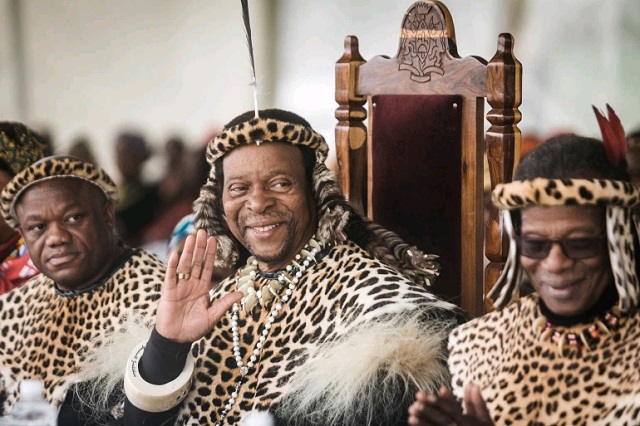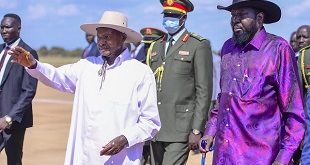
The king wielded great influence among millions of Zulus through his largely ceremonial and spiritual role despite having no official power in modern South Africa
Kampala, Uganda | THE INDEPENDENT | King Goodwill Zwelithini of the Zulu nation in South Africa died on Friday in a hospital where he was being treated for diabetes-related issues. The king, 72, was the leader of South Africa’s largest ethnic group and an influential traditional ruler.
In this tribute, Owek Nuwa Wamala Nnyanzi, the former State Minister of Internal Affairs of Buganda Kingdom shares his experience hosting the Zulu King when he visited Uganda at the commemoration of the Kabaka’s second coronation anniversary in 1995.
My first time to be in the presence of His Majesty Goodwill Zwelithin, King of Zulu was at Entebbe Airport on the tarmac when a plane carrying him and Queen touched down and he disembarked. He was here as a special guest of Ssabasajja Kabaka Ronald Muwenda Mutebi II at the commemoration of the Kabaka’s second coronation anniversary in 1995.
When it was first announced that the King of Zulu would make a Royal visit to Buganda, Uganda, preparations went into high gear. Before that, the last monarch to be a guest of the Kabaka of Buganda was His Majesty Emperor Haile Selassie of Ethiopia. However, the difference between the two royal visits was that the Emperor was a Head of State and so was his host Ssabasajja Kabaka Edward Frederick Mutebi Walugembe Mutesa II. Therefore, there was no need for scratching heads protocol wise.
It’s important to note that Kabaka Mutebi and King Zwelithin weren’t Heads of State although they command immense influence among their subjects, monarchists within and without their kingdoms.
The manner in which to receive the Zulu King was resolved when, according to sources, President Nelson Mandela who was then South Africa’s Head of State telephoned his Ugandan counterpart requesting him to receive the Zulu monarch with reverence because he was a reliable ally pacifying South Africa. That paved way for a red square carpet being placed at the bottom of the stairs for him to step on arrival. This gesture is the second tier in VIP protocol after the red strip of carpet which is rolled out exclusively for heads of state.
I was there as State Minister of Internal Affairs of Buganda Kingdom under which the security of the Kabaka, his family and high profile guests fell. From then on, I took personal charge of his security detail.
It was an interesting and culturally challenging experience. The Royal couple was hosted by one of Kampala’s prominent businessmen in Kololo. The main ceremony was held at Kololo airstrip where President Museveni was the guest of honour. While the President is not known for keeping time, I do not recall him being late at any of the Kabaka’s functions. He would actually call to inquire if they were ready to receive him. With that in mind, I drove to Kololo at around 6:30 am to make sure the Royal guest would be in time to get to the venue before the Principals.
On getting there, I found all those in the Royal entourage ready but I was informed that His Majesty and the Queen were still sleeping. So I inquired from the chief of the Zulu Royal security what could be done to ensure that we didn’t arrive late at the ceremony venue. He advised that we give the Royal couple time to rest for at least another hour which I obliged to, taking into account that Kampala was one hour ahead of Durban. After one hour, I got concerned and once again inquired from the chief of Royal security the next cause of action.
By then I was wondering who was going to knock on the royal door to wake up the royal couple. The chief then turned to the Praise Singer who always accompanies the King wherever he goes to take charge and redeem the situation. The Praise Singer immediately got into character and started chanting in Zulu as he paced up and down next to the Royal window.
I turned to the chief and asked him what was going on. He smiled and said: “He is singing praises of the King while challenging him to be as brave, industrious and early riser as his forefathers especially the mighty Shaka Zulu. Believe it or not, it worked and within an hour, the King and Queen were ready to go.
The following day after the coronation anniversary celebrations, I escorted the King on a tour of Kampala. The Royal entourage comprised of the Queen and her brothers and sisters, who were representing the King of Swaziland now Eswatini. King Zwelithin married a daughter of King Sobhuza of Swaziland. King Sobhuza II is the father of the reigning King of Eswatini Mswati III.
The tour included a visit to NACCAU Arts and Crafts village where the King had said he would just spend a couple of minutes before heading to Kasubi Royal tombs. He ended up spending there almost an hour and when I politely requested that we head to Kasubi, his sisters-in-law, the Swazi princesses politely excused themselves because they found the crafts village exciting and enjoyed shopping. The king had fallen in love with fabrics especially the tie and by Lydia Mugambi and others with African prints. He purchased a few.
On arrival at Kasubi, the King was obviously awed and as we approached the entrance to Muzibu Azaala Mpanga, before I could suggest to him that shoes aren’t allowed into the giant Royal hut, he had already removed his. We entered and I introduced him to the palace minders, who on learning that he was a King, ushered him inside even beyond the clearly-marked area where I had never seen any other person go.
They told us that it’s only the Kings who are permitted to jump over the forest boundary. The area where the four Ba Ssekabaka Mutesa I, Mwanga II, Chwa II and Mutesa II are interred is called kibira (forest) and it is separated by large sheets of barkcloth to signify a forest where Ssekabaka Kintu disappeared together with his Queen Nambi Nantutululu.
As it is the tradition among many Kingdoms, whoever enters revered spaces offers a token of appreciation, King Zwelithin wrote a cheque and placed it in one of the baskets before taking leave. I also remember him for his sense of unique dressing and style. His suits were custom made and the patterns personal to himself.
May the Almighty God grant the Royal families of Zulu and Eswatini, subjects and allies the grace to deal with the loss!
*****
URN
 The Independent Uganda: You get the Truth we Pay the Price
The Independent Uganda: You get the Truth we Pay the Price



